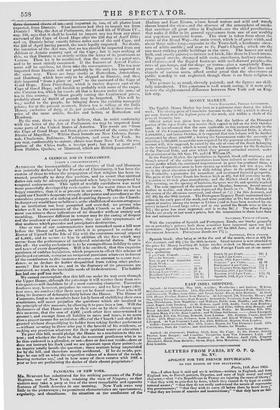A CLERICAL JOB IN PARLIAMENT.
[FROM A CORREAPONDENT.
Atrimucit the incompatibility of the services of God and Mammon was pointedly declared by the Founder of Christianity, it has been the custom of those to whom the propagation of that religion has been in- trusted, practically to deny this position, and to assert that spiritual duties can only be adequately performed when largely recompensed by temporal endowments. This spirit of worldly carefulness was never more powerfully developed by ecclesiastics in the worst times or least happy countries, than it is at present in our own. Whether we are to regard our Church's desperate struggle after power and ascendancyas the convulsive graspers of a sinking and despairing dynasty (as the Church- in-danger cry would have us believe), or the ebullition of wanton arrogance by an institution too long pampered and over-fed, no person who wishes well to the existence of the English Church as an Establish- ment can witness these indications of its disorder without anxiety and trembling. However different in temper may be the raving of despair and the insolence of successful avarice, they are alike symptomatic of that madness which precedes and precipitates destruction. One or two of our contemporaries have remarked upon a bill now before the House of Lords, by which it is proposed to endow the Rector of Upwell in the Isle of Ely with the enormous annual stipend of 4,5001., and to secure to him in addition all the fees which may accrue from the performance of incidental ministerial duties. Nor is this nil: the worthy ecclesiastic is to be exemptedfrom liability to rates and taxes of every description. Will it be credited, that this exquisite specimen of embryo legislation, which proposes to effect this scheme of privileged extortion, contains no reciprocal provision whatever in favour of the contributors to this immense revenue—no attempt to secure resi- dence, or to declare its holder disqualified from taking other prefer- ments ? But it is even so; and in the flagrancy of its provisions are contained, we trust, the inevitable seeds of its destruction. The bubble has had one puff too much. We cannot contemplate that this bill can make its way even through the Upper House, although the patronage it will receive there from cer- tain quarters will doubtless be of a most caressing character. Excessive fondness may, however, prejudice its success ; and we have hopes (dis- tant ones, we confess) that there may yet be found some Peer who will bring its features of deformity fairly before the House. The House of Commons, fond as its members have lately been of stultifying their own tesolutions, will Bever prejudice the questions which are involved in the principle of this measure, by allowing it to pass into a law. Will the Reformers of that House attest by their vote or by their silence upon this measure, that the sum of 4500/. (with other fees unascertained in amount), and exempt from all liability to rates and taxes, is no more than a proper income for an inferior officer of the Church? and shall it be granted without disqualifying its bolder from taking further preferment —without seeuring to those who pay it the benefit of his residence, or making any provision whatever for their spiritual wants or education? To pass this bill, would pledge the House to a resolution to this ex- tent; and whether the facts be that the reverend gentleman who is to be thus endowed is a pluralist, or not—does or does not reside—does or does not instruct his flock (and we are ignorant upon these points)—is an inquiry totally beside the question; these matters being unprovided for by the bill, and therefore merely accidental. If he do reside, per- haps he can tell us what the respective values of a dozen of the neigh- bouring rectories are,: maid in how many of them curates with 1001. a year or less are performing the duties of their absent proprietors?


















 Previous page
Previous page